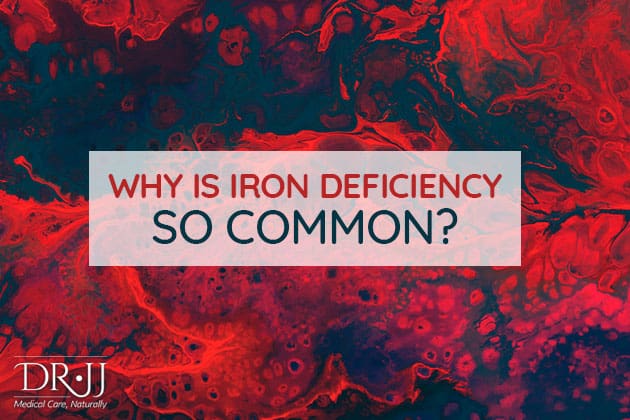
Iron is a mineral that packs a whole lot of punch.
However, more and more people are finding themselves iron deficient.
Iron deficiency can be triggered by many different conditions, but can also be a result of a lifestyle that doesn’t see enough iron intake naturally.
Many people with iron deficiencies don’t realize the problem and attribute the symptoms they’re experiencing to any number of other possible causes.
However, the good news is that iron deficiency can be treated very well, naturally, using naturopathic principles and treatments.
My name is Dr. JJ, a naturopathic doctor practising out of Toronto, Ontario.
Today, we’re going to dive deep into the topic of iron deficiency.
Why Do We Need Iron?
Your body needs enough iron to stay healthy.
Iron is an essential ingredient in red blood cells.
It helps them transport oxygen, or hemoglobin, to tissue throughout your body.
This is the reason why common signs of anemia are chronic tiredness and shortness of breath.
RELATED: Intravenous Therapy For Energy
Risk Factors For Iron Deficiency
You’re more susceptible to iron deficiency if you’re:
- An infant
- A young child
- A vegetarian or vegan
- Of age to menstruate
- Someone who regularly donates blood
When you menstruate, you lose a significant amount of blood, which is where most of your iron is.
The heavier your periods are, the more likely you are to experience anemia.
Children need extra iron due to their accelerated growth.
This helps to ensure healthy bone, muscle, and tissue growth.
That’s why a healthy, well balanced diet is so important during your formative years.
Infants are more likely to be anemic if they’re born prematurely, with a low birth weight, or if they aren’t getting enough iron through their breast milk or formula.
While there are plenty of plant based sources of iron, the most common dietary sources are found in red meat.
So, vegetarians and vegans typically need to be more mindful than their omnivorous friends.
Finally, because frequent blood donors regularly need to replenish their blood, they need to replenish their iron through their diet.
Causes Of Iron Deficiency
The most common causes of iron deficiency typically stem from one of two causes: not getting enough iron in your diet or experiencing blood loss.
Here are some more specific examples:
1. Inadequate Dietary Iron
As we previously discussed, iron is essential for oxygen transportation throughout your whole body.
Therefore, it’s important that you consume at least enough to sustain healthy growth and oxygen levels.
If you’re finding your diet isn’t providing enough iron to keep you going, consider iron supplements.
Talk to me before you start supplementing iron though.
Iron can interfere with the absorption of certain other nutrients, including calcium.
Good dietary sources of iron include:
- Meat, including fish and poultry
- Eggs
- Beans
- Peas
- Lentils
- Tofu
- Spinach
- Beets
- Quinoa
- Whole oats
- Whole grain bread
- Nuts and seeds
- Some dried fruits, such as raisins
RELATED: Superfoods For A Stronger Mind

2. Inability To Absorb Iron
In some cases, you may experience anemia despite consuming an appropriate amount of iron.
When this occurs, your body may be struggling to absorb the iron you’re consuming.
Certain digestive or intestinal disorders are a potential culprit.
As iron is absorbed into your bloodstream, some of it also finds its way into your small intestine.
Some digestive issues may disrupt this process and prevent your body from absorbing nutrients from digested food.
Some examples include celiac disease and having an intestinal bypass or removal.
RELATED: Naturopathic Solutions For Digestive Issues
3. Endometriosis
Endometriosis is a fairly common condition affecting around 10% of cisgender women, primarily during their childbearing years.
Endometriosis causes the uterine lining to grow outside the uterus, creating bloody lesions which contributes to very heavy and much longer menstrual cycles.
The body is not designed to handle the additional blood loss from these lesions, and iron deficiency is a common result.
4. Pregnancy Or Menstruation
If you’re pregnant or of reproductive age, it’s important to monitor your iron levels.
As you menstruate, you lose both blood, and the iron stored in it.
That leaves you at the same risk for iron deficiency as somebody who regularly donates blood.
Iron deficiency is a particular risk if you’re pregnant.
That’s because you’re supplying blood and iron not only for yourself, but for your growing baby as well.
For this reason, many maternity supplements contain a higher dose of iron than regular multivitamins.
RELATED: Fertility & Pregnancy Support
5. Internal Bleeding
When you hear of internal bleeding, your mind may conjure up an image of a massive internal trauma like the ones you see on TV.
In reality, internal bleeding more often refers to a slow, consistent loss that can cause iron deficiency.
Examples of such types of bleeding can come from a colon polyp, colorectal cancer, peptic ulcer, or hiatal hernia.
The gastrointestinal system is often the culprit of internal bleeds and is sometimes the result of medications such as aspirin, which is notoriously hard on the stomach.
How Common Is Iron Deficiency?
In a study published in 2018, it’s reported that iron deficiency anemia is a far larger issue than many people recognize.
The World Health Organization estimates that over 30% of the world’s population is anemic, of which 50% is attributable to iron deficiency anemia.
The study further details how much iron deficiency anemia can affect the outcomes of other conditions and diseases, and can also predict ‘fragility, function and mortality’ in the elderly.
Treatments For Iron Deficiency
Not only are these statistics surprising, they are also unfortunate.
This is because iron deficiency is fairly easy to address.
Let’s have a look at some of the steps you can take to avoid experiencing iron deficiency.
1. Iron Supplements
Children need more iron in their diets than adults due to their rapid growth rate.
Additionally, those who menstruate will need more iron from puberty to menopause because of blood loss associated with menstruation and pregnancy.
For this reason, prenatal vitamins often have elevated iron levels, but don’t always contain the recommended amount.
Therefore, it’s important that you make sure to ask your healthcare professional to recommend the right vitamin for you.
Iron supplements can occasionally cause side effects such as constipation or diarrhea, as well as nausea and vomiting.
A stool softener can lessen some of these effects, if necessary.
One warning about iron supplements is to keep them on a high shelf away from children, as too much iron can be toxic, especially for kids.
2. Intravenous Infusion Treatment
For most, iron supplements are all that’s needed.
In some cases, however; your healthcare professional will recommend that iron be administered intravenously.
More iron can be administered directly to the blood stream this way.
This makes it a good option for those who can’t absorb iron sufficiently through their stomach, or can’t absorb it fast enough due to blood loss.
Iron IV transfusions will often be done in a hospital or hemodialysis center and can take up to 5 hours to complete.
You may have to attend several sessions over a few weeks, depending on your iron needs.
3. Treating The Root Cause
While many healthcare professionals will treat the symptoms – the iron deficiency itself – I will also look to the root cause of the iron deficiency anemia and concurrently treat that as well.
This best ensures your relief will be long lasting.
We have already discussed some of the factors that I look for, but there are many other lesser known conditions that I can advise on how to manage or address.
No matter how it’s treated, if the underlying issues are not addressed, you have opened a door for the anemia to return.
This is why it’s important for you to understand what has caused the iron deficiency to begin with.
Questions? Ask Dr. JJ
Iron deficiency can be a complicated issue with many difficult outcomes, but it can also be simply treated in many cases.
While you are certainly able to increase your iron intake through adjusting your diet, adding supplements should be done under the guidance of a professional.
As a naturopathic doctor, I’m here to help you.
If you’ve been feeling tired or short of breath, or have experienced any of the causes listed above, call me now to book a consultation.
You can’t come into the office for an appointment?
Not a problem.
I also offer virtual naturopathic doctor consultations in Ontario.
Naturopathic treatments can help you restore your iron levels and improve your overall health.
Book your appointment with me, Dr. JJ, today to find out more.
If you have questions about naturopathic medicine, or you’d like to take your first step into the world of naturopathy, contact me, Dr. JJ, and let’s book an appointment.
Yours in health,
Dr. JJ Dugoua, Naturopathic Doctor
600 Sherbourne St, Suite 315,
Toronto, ON M4X 1W4
-https://g.page/AskDrJJ
Dr. JJ Dugoua is a naturopathic doctor in Toronto and has a PhD in Pharmaceutical Sciences. His clinic provides solutions for many health concerns and has a special focus on thyroid health issues.



